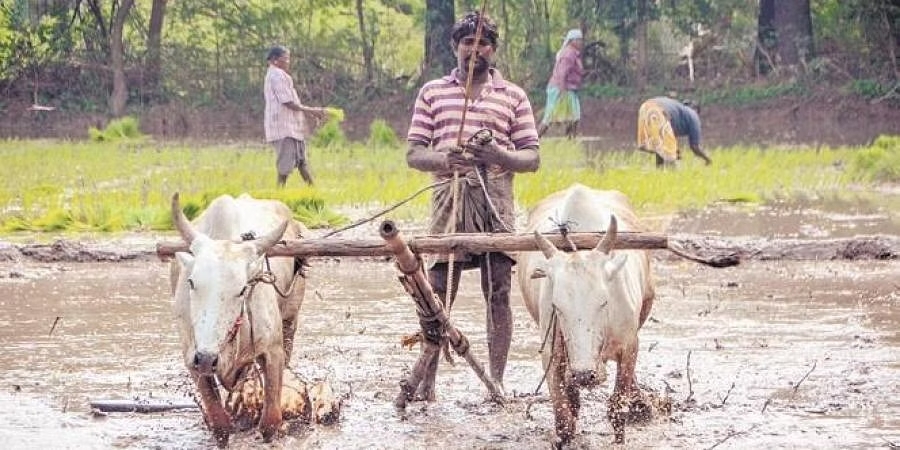
Provide farmers with a legally guaranteed price, and Indian agriculture will emerge as the second engine of economic growth
The deplorable price a vegetable grower from Mahasamund in Chhattisgarh received a few weeks back for his brinjal crop sums up the travails of a farming family. After taking 1,475 kg of brinjal harvest to the Raipur market, the price he received was so low that after deducting the expenses he incurred, including the transportation cost, he ended up paying an extra ₹121 from his pocket. This shocking news came when the government introduced a mechanism of the minimum sale price (MSP) to protect sugar mills from losses. Since June 2018, a provision for paying a minimum price has been made for the sugar industry, which has now been hiked to ₹31 per kg. In other words, while the Chhattisgarh farmer suffered a complete loss and in fact, paid an additional ₹121 literally as a tax for bringing his produce to the market, the powerful sugar industry’s cost of production plus profit is all ensured.
There was an estimated carryover stock of 8.5 million tonnes of sugar at the beginning of the 2021–22 marketing season. Despite such a record surplus, and an increased output subsequently, the prices of sugar at which the mills have sold their stock haven’t slipped below the benchmark price. This goes against the provisions of competitive prices in a market economy. Still, the government seems more than keen, and rightly so, to protect the powerful sugar industry from any impending collapses. Now, this is exactly what the farmers are demanding. Farmers, too, need a living income by way of an assured price. Several studies have shown that after 2016–17, the growth in farmers’ income has not kept pace with the rising inflation.
According to the Situation Assessment Survey of Agricultural Households, Land and Livestock Holdings of Households of Rural India, 2019, the average farm household income from farming operations alone (not including non-farm activities) comes to ₹3,798, which means an average of ₹27 per day. With such a meagre farm income from farming operations, the challenge is increasing it so that agriculture becomes an economically viable enterprise. This is also essential considering that agriculture is the largest employer in the country and, therefore, has the potential to reboot the economy.
If the sugar mills can be protected against losses, in her Budget 2023 speech, Finance Minister Nirmala Sitharaman needs to ensure that the same provisions are expanded to cover the farming sector, so as to catapult agriculture onto a path of unprecedented growth. Seventy-five years after Independence, and in the Amrit Kaal period leading to India at 100, providing an assured and guaranteed price to farmers is the way to pull out Indian agriculture from continuing agrarian crisis. This is the real Production Linked Incentive (PLI) that India needs. Why should farmers be forced to sell at distress prices when they produce record harvests? Provide farmers with a legally guaranteed price, and Indian agriculture will undoubtedly emerge as the second engine of economic growth.
Besides brinjal, news reports have repeatedly appeared about how irate farmers have thrown garlic, onion, tomato and other produce onto the streets. Farmers have burnt banana crops, and now even the plantation sector, after the recent collapse of rubber plantations, is crying for attention. In any case, except for wheat and paddy that is procured at the MSP in certain regions, most commodities are invariably sold at distress prices. That is why even after the three contentious farm laws were withdrawn, farmers continued to demand a legally guaranteed MSP.
Being the last full budget before the next elections, it is believed agriculture will receive more attention in the forthcoming budget and, therefore, the possibility of some out-of-the-box thinking leading to a revival of the farming sector. Doubling the direct income support under the PM-Kisan scheme from the existing ₹6,000 to ₹12,000 per year should be one mechanism to supplement farmers’ income.
The other area that needs focus is on building climate-resilient agriculture. When agriculture globally is being held responsible for a third of the greenhouse gas (GHGs) emissions and already the rising temperatures cast an ominous spell on the future of food and agriculture, the finance minister should lay out a roadmap for a transition towards agro-ecological farming. Provisions for allocations for programmes and projects delivering benefits for soil, air, water, climate and biodiversity protection and conservation need to be spelt out. Like Project Tiger, a programme to rebuild soils, too, needs to be launched. The devastation in soil health and the growing desertification should be an area of priority attention.
Further, budgetary provisions can indicate a direction the government intends to follow by shifting the focus from international industrial value chains to local and short value chains dependent on ecological farming practices. The Community Managed Natural Farming (CMNF) programme that Andhra Pradesh follows, which claims to have shifted 7 lakh farmers who were earlier practising chemical farming, to non-chemical farming systems, is a laudable initiative that calls for replication.
Adequate allocations need to be made for states willing to take the non-chemical farming route. The CMNF programme, the largest agro-ecological farming system in the world, can also be showcased to G-20 member countries.
Already, the European Union has announced a budgetary provision of 264 billion euros under the Common Agricultural Policy beginning January 1, 2023, for a food transformation based on sustainable and resilient agriculture. The Global Biodiversity Framework emanating from COP15 has called for a reduction in pesticide usage by two-thirds by 2030. Although the agrochemical industry wants to be included under the PLI scheme, the time has come to reduce domestic production potential to achieve global targets. This will give an added push to the growing consumer preference for safe and healthy food.
By:
Devinder Sharma
